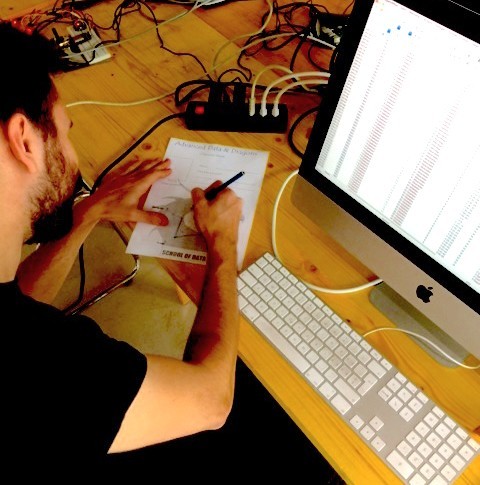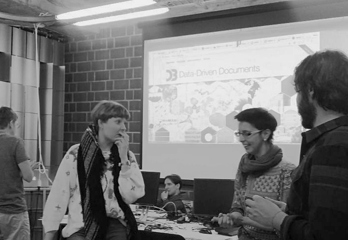Many thanks to the entire MuDA team for the chance to support their first data literacy workshop - a genuine pleasure and mind opening experience to be a part of. A quick recap follows.
We kicked off together on Monday with
- paper brainstorming tools
- a set of Apple/RasPi workstations set up by MuDA
- printed data maps of the neighbourhood designed by Katrin
- paper and online learning materials from the School of Data
- urban sensing hardware from Make Zurich
- 3 chatbots to keep us company: Chatlio, Sodabot and Herr Schlaumeier
The workshop itself started with a long discussion, all our participants had a chance to introduce themselves, share interests and ideas. We heard each other’s perspective on what kind of skills we bring to the table as makers and creatives, and where we are less sure of ourselves.

Then we tried to understand each other’s definitions of ‘data’, and what kind of information or objects or patterns we rely on in everyday life. We dived into a bunch of open data sets, pulled together some DIY sensors, talked and wrote about subjects that would possibly inspire us in a data artwork.
There was little facilitation required due to a lot of introspection and strongly self-guided exploration. Since our first Data Expeditions catered to people with more experience in data wrangling or visualisation, during the workshop we also started looking into supporting more basic tools at future events.
We used Dribdat and Slack to keep track of project suggestions along 4 themes: Awareness, Openness, Making, Sharing. You can see these at bd.schoolofdata.ch or all one one page (PDF; 1.9MB)
Next steps, datanauts!
We plan to debrief with MuDA in the days ahead, see what they thought of our approach and platforms, find out what they learned from the experience of the museum as playground for data wranglers, and find out how we could play a role in their data literacy program in the future.
The project ideas should continue to be developed, and I believe we should help them collect interesting logs and other fertile soil for data art exhibitions, as well as to work with artists directly. There are some wider questions that I would like to take back and discuss, such as:
- documenting, reproducing and refining this type of (“open data literacy”) workshop
- gaining external support so that we can do a better job next time and have the means of showing up and being involved regularly
- what possibilities the museum space offers for kindling ideas and supporting data culture - ideally in partnership with openglam.ch
- discuss how to measure social impact and orientate our work here in light of the constellation of subjects addressed in this collaboration so far - from migration politics and open georeferenced data, to urban development and machine learning, to sensing the city and conversational platforms.
Please feel free to add any thoughts or ideas here or in-Channel.
And please check out MuDA’s ear-opening, circuit bending and affordable festival coming up next!

^ visualisation of the Sound of MuDA, one of the workshop projects



